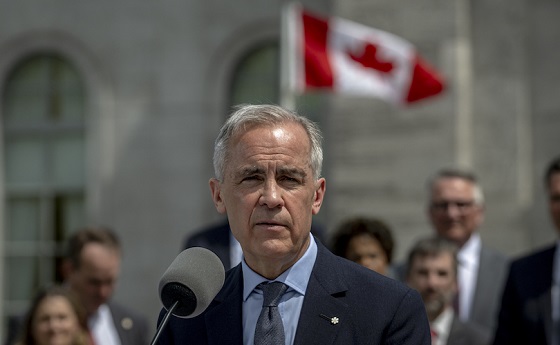Uncategorized
May battles to keep Brexit on track after no-confidence win

LONDON — British Prime Minister Theresa May was consulting opposition parties and other lawmakers Thursday in a battle to put Brexit back on track after surviving a no-confidence vote, though there was little immediate sign of a breakthrough from talks branded a “stunt” by the main opposition leader.
European Union countries were stepping up preparations for a disorderly British exit on March 29 after the U.K. Parliament rejected May’s Brexit withdrawal deal with the bloc.
Lawmakers threw out the deal Tuesday, in a crushing defeat for May, who suffered the worst parliamentary defeat in modern British history.
The drubbing was followed by a no-confidence vote in the government, but May’s minority Conservative government survived it on Wednesday night with backing from its Northern Irish ally, the Democratic Unionist Party.
May said she would hold talks “in a constructive spirit” with leaders of opposition parties and other lawmakers in a bid to find a way forward for Britain’s EU exit.
The government confirmed that May will meet a Monday deadline to publish a Plan B, and that lawmakers will have a full day to debate it — and, crucially, amend it — on Jan. 29.
There was little sign of a breakthrough in uniting Parliament’s feuding Brexit factions, whose conflicting demands range from a postponement of Britain’s departure date to a new referendum on whether to leave the EU or remain.
Jeremy Corbyn, leader of the main opposition Labour Party, said he wouldn’t meet with May until she took a no-deal Brexit “off the table.”
“To get a deal that can command a majority in Parliament, Theresa May has to ditch the red lines and get serious about proposals for the future,” Corbyn said during a speech to supporters in the English seaside town of Hastings.
“Last night’s offer of talks with party leaders turned out to be simply a stunt, not the serious attempt to engage with the new reality that’s needed,” he said.
Green Party lawmaker Caroline Lucas, who met with May on Thursday morning, said the prime minister was “in a fantasy world” if she thought the deal could be transformed by Monday.
“Parliament is gridlocked,” she said.
May so far has showed little inclination to make major changes to her deal or lift her insistence that Brexit means leaving the EU’s single market and customs union. Many lawmakers think a softer departure that retained single market or customs union membership is the only plan capable of winning a majority in Parliament. They fear the alternative is an abrupt “no-deal” withdrawal from the bloc, which businesses and economists fear would cause turmoil.
Former Prime Minister Tony Blair, a longtime Labour Party leader, told the BBC on Thursday that it would be “sensible” for Corbyn to meet with May to better define the type of Brexit that Britain wants. He warned that a “no-deal” Brexit would do substantial harm to Britain’s economy.
As Britain flounders, the 27 other EU countries have stood firm, saying they won’t renegotiate the withdrawal agreement and insisting the British government and its lawmakers to decide what they want to do.
Some British lawmakers want May to call for an extension of negotiations with the EU and postpone the March 29 deadline to leave the bloc, while others are lobbying for a second Brexit referendum.
French Prime Minister Edouard Philippe held a special government meeting Thursday on planning to cope with a “no-deal” Brexit.
The French parliament adopted a law Wednesday allowing emergency measures after March 30 in the event Britain leaves without a deal.
Such measures could aim to reduce problems in cross-border trade and transport, notably through the Eurotunnel beneath the English Channel, and allow British workers and retirees based in France temporary permission to stay until a longer-term deal is worked out.
Throughout the Brexit negotiations, EU leaders accused Britain of trying to “cherry pick” benefits of membership in the bloc, seeking to retain access to the EU’s single market while ending the free movement of European citizens into Britain and breaching other EU guiding principles.
EU Brexit negotiator Michel Barnier, who said Wednesday that he was more concerned than ever that Britain could crash out of the EU without an agreement, said the red lines set out by Britain’s negotiators had “shut doors.”
Barnier said Thursday that “getting an agreement is in everybody’s interest” and that “something has to change” to secure a divorce deal.
“If (the red lines) change, we’ll change,” Barnier said after meeting Portuguese officials in Lisbon.
___
Frank Griffiths in London, Angela Charlton in Paris, and Barry Hatton, in Lisbon, Portugal, contributed to this report.
___
This story has been corrected to show that the meeting in France was held by Prime Minister Edouard Philippe, not President Emmanuel Macron.
Jill Lawless And Gregory Katz, The Associated Press
Uncategorized
Trump Admin Establishing Council To Make Buildings Beautiful Again


From the Daily Caller News Foundation
By Jason Hopkins
The Trump administration is creating a first-of-its-kind task force aimed at ushering in a new “Golden Age” of beautiful infrastructure across the U.S.
The Department of Transportation (DOT) will announce the establishment of the Beautifying Transportation Infrastructure Council (BTIC) on Thursday, the Daily Caller News Foundation exclusively learned. The BTIC seeks to advise Transportation Secretary Sean Duffy on design and policy ideas for key infrastructure projects, including highways, bridges and transit hubs.
“What happened to our country’s proud tradition of building great, big, beautiful things?” Duffy said in a statement shared with the DCNF. “It’s time the design for America’s latest infrastructure projects reflects our nation’s strength, pride, and promise.”
“We’re engaging the best and brightest minds in architectural design and engineering to make beautiful structures that move you and bring about a new Golden Age of Transportation,” Duffy continued.
Mini scoop – here is the DOT’s rollout of its Beautifying Transportation Infrastructure Council, which will be tasked with making our buildings beautiful again. pic.twitter.com/
9iV2xSxdJM — Jason Hopkins (@jasonhopkinsdc) October 23, 2025
The DOT is encouraging nominations of the country’s best architects, urban planners, artists and others to serve on the council, according to the department. While ensuring that efficiency and safety remain a top priority, the BTIC will provide guidance on projects that “enhance” public areas and develop aesthetic performance metrics.
The new council aligns with an executive order signed by President Donald Trump in August 2025 regarding infrastructure. The “Making Federal Architecture Beautiful Again” order calls for federal public buildings in the country to “respect regional architectural heritage” and aims to prevent federal construction projects from using modernist and brutalist architecture styles, instead returning to a classical style.
“The Founders, in line with great societies before them, attached great importance to Federal civic architecture,” Trump’s order stated. “They wanted America’s public buildings to inspire the American people and encourage civic virtue.”
“President George Washington and Secretary of State Thomas Jefferson consciously modeled the most important buildings in Washington, D.C., on the classical architecture of ancient Athens and Rome,” the order continued. “Because of their proven ability to meet these requirements, classical and traditional architecture are preferred modes of architectural design.”
The DOT invested millions in major infrastructure projects since Trump’s return to the White House. Duffy announced in August a $43 million transformation initiative of the New York Penn Station in New York City and in September unveiledmajor progress in the rehabilitation and modernization of Washington Union Station in Washington, D.C.
The BTIC will comprise up to 11 members who will serve two-year terms, with the chance to be reappointed, according to the DOT. The task force will meet biannually. The deadline for nominations will end Nov. 21.
Uncategorized
New report warns WHO health rules erode Canada’s democracy and Charter rights

The Justice Centre for Constitutional Freedoms has released a new report titled Canada’s Surrender of Sovereignty: New WHO health regulations undermine Canadian democracy and Charter freedoms. Authored by Nigel Hannaford, a veteran journalist and researcher, the report warns that Canada’s acceptance of the World Health Organization’s (WHO) revised International Health Regulations (IHR) represents a serious erosion of national independence and democratic accountability.
The IHR amendments, which took effect on September 19, 2025, authorize the WHO Director-General to declare global “health emergencies” that could require Canada to follow directives from bureaucrats in Geneva, bypassing the House of Commons and the will of Canadian voters.
The WHO regards these regulations as “binding,” despite having no ability or legal authority to impose such regulations. Even so, Canada is opting to accept the regulations as binding.
By accepting the WHO’s revised IHR, the report explains, Canada has relinquished its own control over future health crises and instead has agreed to let the WHO determine when a “pandemic emergency” exists and what Canada must do to respond to it, after which Canada must report back to the WHO.
In fact, under these International Health Regulations, the WHO could demand countries like Canada impose stringent freedom-violating health policies, such as lockdowns, vaccine mandates, or travel restrictions without debate, evidence review, or public accountability, the report explains.
Once the WHO declares a “Pandemic Emergency,” member states are obligated to implement such emergency measures “without delay” for a minimum of three months.
Importantly, following these WHO directives would undermine government accountability as politicians may hide behind international “commitments” to justify their actions as “simply following international rules,” the report warns.
Canada should instead withdraw from the revised IHR, following the example of countries like Germany, Austria, Italy, Czech Republic, and the United States. The report recommends continued international cooperation without surrendering control over domestic health policies.
Constitutional lawyer Allison Pejovic said, “[b]y treating WHO edicts as binding, the federal government has effectively placed Canadian sovereignty on loan to an unelected international body.”
“Such directives, if enforced, would likely violate Canadians’ Charter rights and freedoms,” she added.
Mr. Hannaford agreed, saying, “Canada’s health policies must be made in Canada. No free and democratic nation should outsource its emergency powers to unelected bureaucrats in Geneva.”
The Justice Centre urges Canadians to contact their Members of Parliament and demand they support withdrawing from the revised IHR to restore Canadian sovereignty and reject blind compliance with WHO directives.
-

 Justice2 days ago
Justice2 days agoCarney government lets Supreme Court decision stand despite outrage over child porn ruling
-

 Daily Caller2 days ago
Daily Caller2 days agoUS Eating Canada’s Lunch While Liberals Stall – Trump Admin Announces Record-Shattering Energy Report
-

 Business2 days ago
Business2 days agoCarney’s budget spares tax status of Canadian churches, pro-life groups after backlash
-

 COVID-192 days ago
COVID-192 days agoFreedom Convoy leader Tamara Lich to appeal her recent conviction
-

 Energy2 days ago
Energy2 days agoEby should put up, shut up, or pay up
-

 Business2 days ago
Business2 days agoThe Liberal budget is a massive FAILURE: Former Liberal Cabinet Member Dan McTeague
-

 Daily Caller1 day ago
Daily Caller1 day agoUN Chief Rages Against Dying Of Climate Alarm Light
-

 Business17 hours ago
Business17 hours agoCarney budget continues misguided ‘Build Canada Homes’ approach










